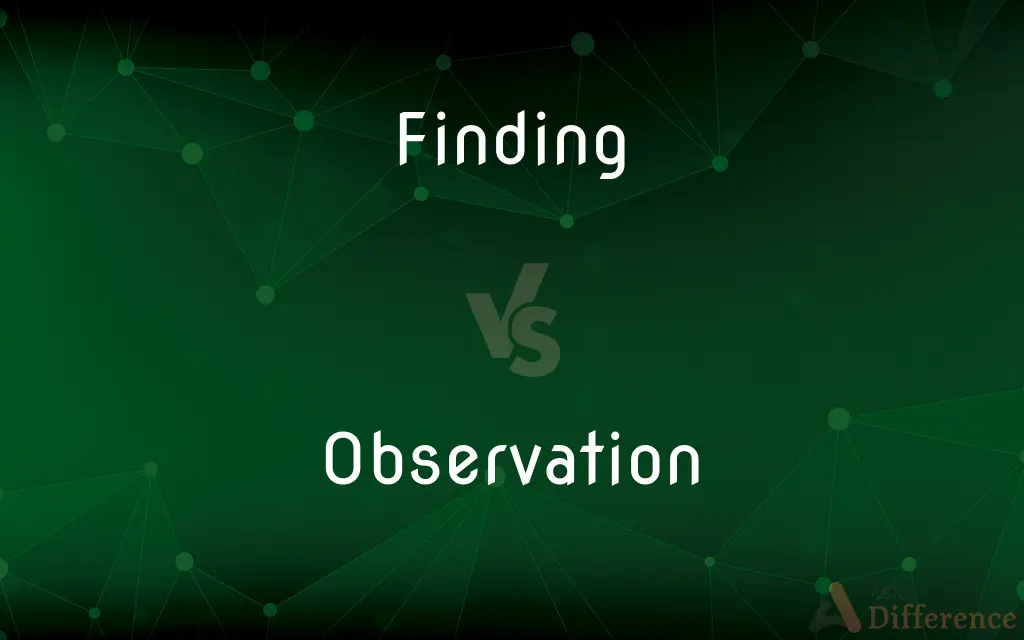Finding vs. Observation — What's the Difference?
By Maham Liaqat & Urooj Arif — Updated on February 26, 2024
Finding refers to the result of an investigation or search, often presenting new information or conclusions, while observation involves actively noticing or perceiving phenomena, usually as a passive process.

Difference Between Finding and Observation
Table of Contents
ADVERTISEMENT
Key Differences
Finding is the outcome of a deliberate search or investigation, aimed at uncovering facts or truths. It implies a process that leads to discovery, often in a formal or research context. For example, scientific findings result from structured experiments. Observation, on the other hand, is the act of noticing or watching phenomena as they occur, without necessarily looking for them. It is more about recording or acknowledging what is already there, often the first step in scientific inquiry.
Findings are typically associated with the conclusion of an investigation, observations are ongoing, serving as the foundational data that may lead to a finding. Observations can be systematic or casual, but they are always about gathering data from the environment.
Findings often result from analyzing observations. The observations serve as the raw data that, when systematically reviewed, can lead to findings. This relationship shows how observation is integral to the discovery process.
The distinction also lies in their presentation. Findings are often reported in a conclusive manner, presenting evidence and outcomes, while observations are noted for their descriptive nature, detailing what was seen or measured without drawing conclusions.
Comparison Chart
Definition
Result of an investigation or search
Act of noticing or perceiving phenomena
ADVERTISEMENT
Purpose
To uncover facts or truths
To record or acknowledge phenomena
Process
Involves analysis and synthesis of data
Involves watching or noting phenomena
Outcome
Conclusive, often leads to new information
Descriptive, serves as foundational data
Role in Research
Often the conclusion or result of a study
Typically the initial step or part of data gathering
Compare with Definitions
Finding
The audit's finding indicated discrepancies in the accounts.
Observation
The observation deck offers a panoramic view of the city.
Finding
Their latest finding challenges previous theories in physics.
Observation
Her observation of the birds led to a new theory in animal behavior.
Finding
The court's finding on the case was unanimous.
Observation
His observation about the weather was accurate.
Finding
The finding of the study showed a significant link between diet and health.
Observation
The scientist recorded her observations in the lab notebook.
Finding
The archaeological finding revealed ancient urban planning.
Observation
Through careful observation, he noted the plant's growth patterns.
Finding
Something that has been found.
Observation
Observation is the active acquisition of information from a primary source. In living beings, observation employs the senses.
Finding
A conclusion reached after examination or investigation
The finding of a grand jury.
A coroner's findings.
Observation
The act of observing
Observations of a rare bird.
Finding
Findings Small tools and materials used by an artisan
A jeweler's findings.
Observation
The power or faculty of observing.
Finding
A result of research or an investigation.
Observation
The fact of being observed
Kept the suspect under observation.
Finding
The act of discovering something by chance, an instance of finding something by chance.
Observation
The act of observing, and the fact of being observed (see observance)
Observation
The act of noting and recording some event; or the record of such noting.
Observation
The act or the faculty of observing or taking notice; the act of seeing, or of fixing the mind upon, anything.
My observation, which very seldom lies.
Observation
The act of observing; taking a patient look
Observation
Facts learned by observing;
He reported his observations to the mayor
Observation
The act of noticing or paying attention;
He escaped the notice of the police
Common Curiosities
How does a finding differ from an observation?
A finding is a conclusive result often derived from observations, while an observation is the act of noticing phenomena without immediate analysis.
Are findings always based on observations?
While findings often rely on observations, they can also come from other sources like experiments and analyses.
Can observations lead to findings?
Yes, systematic observations can serve as data that, when analyzed, may result in findings.
What does observation mean?
Observation is the act of noticing or perceiving phenomena, typically without actively searching for them.
How do scientists use observations?
Scientists use observations as data to form hypotheses, conduct experiments, and ultimately derive findings.
What is a finding?
A finding is the result or conclusion drawn from an investigation or research, often presenting new information.
Is observation only used in scientific contexts?
No, observation can be applied in everyday situations as well as in scientific research to gather information.
Can findings change over time?
Yes, as new observations and data are gathered, findings may be revised or updated.
Is an observation considered a fact?
An observation records what is perceived, which can be factual but is subject to the accuracy of the observer's senses.
How are findings presented?
Findings are typically presented in a conclusive manner, often as part of research reports, studies, or legal decisions.
How are observations recorded?
Observations can be recorded in various ways, including notes, photographs, recordings, or specific scientific instruments.
Are all findings significant?
Not all findings are significant; their importance depends on their implications, novelty, and the context in which they are discovered.
Can anyone make an observation?
Yes, anyone can make observations, but the accuracy and relevance depend on the observer's knowledge and context.
Can observations be biased?
Yes, observations can be subject to bias based on the observer's perspective, knowledge, and expectations.
What role do findings play in research?
Findings play a crucial role in advancing knowledge, challenging existing theories, and informing further research.
Share Your Discovery

Previous Comparison
Close vs. Closer
Next Comparison
Inexplicable vs. UnexplainableAuthor Spotlight
Written by
Maham LiaqatCo-written by
Urooj ArifUrooj is a skilled content writer at Ask Difference, known for her exceptional ability to simplify complex topics into engaging and informative content. With a passion for research and a flair for clear, concise writing, she consistently delivers articles that resonate with our diverse audience.
















































